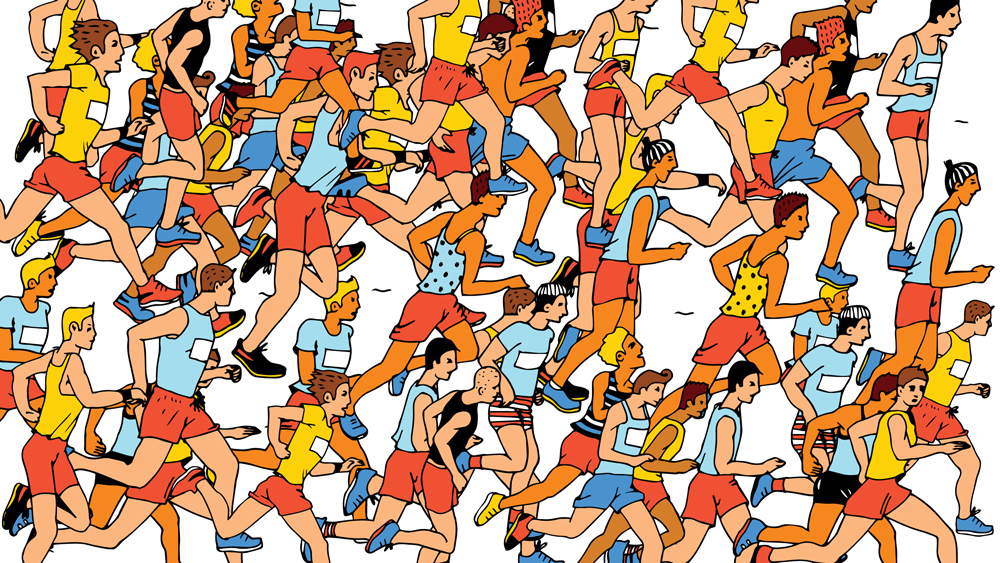Can Anyone Run A Marathon?
Pretty much! If you’ve been inspired by the London Marathon, start now and you’ll be ready to take on next year’s race

Running a marathon takes guts, carbohydrates and a whole lot of training. For many people it’s the toughest physical challenge they’ll tackle in their lifetime – but given enough time to prepare, just about anyone can run a marathon.
If you watched the London Marathon over the weekend and decided that you’d like to get in on the action, there is absolutely no need to wait to start training for it. Even if you don’t manage to get a ballot place or charity spot in the race there are plenty of other marathons to run, and you’ll be reaping the health benefits – both mentally and physically – of the running you’ve already done.
And if that’s enough to convince you, start marathon training 12 months before the big day and you can take your time to scale up your running very slowly, reducing the risk of injury and increasing your enjoyment of the sport. We spoke to Nick Anderson from Running With Us, Polar’s official training partner, about the best way to spend a year training for the marathon.
How should a beginner break up a year of running to train for a marathon?
Your first goal is to train for a 5K rather than try to run a long way. In eight weeks you’ll be able to run your first 5K all the way round without stopping. Then there’s a natural progression to a 10K.
Train for a half marathon, with the odd break here and there, and you’ll be starting your marathon training in a really good place, regularly doing a long 60- to 90-minute weekend run and some other clever runs in the week, like threshold running, intervals and hill runs.
Do that and you will be so ready to do your first marathon you’ll probably end up following an improvers’ rather than a beginners’ plan – and your marathon will go really well.
If you are unfit or overweight right now, how do you make running more enjoyable and reduce the risk of injury?
Don’t try to run too far or too fast. Run at the speed of chat – if you can’t hold a conversation then you’re running too hard. Wear a heart rate monitor, record your training and start to look at your sleep recovery. Check the amount of steps you do in the day and your general activity – you want to become a physically fit human being first of all.
Get the Coach Newsletter
Sign up for workout ideas, training advice, reviews of the latest gear and more.
Make yourself strong enough to run. Maybe see a physio and have a body MOT, rather than getting injured in six months’ time and going to see a physio then, which is what most people do. Do strength training for runners so you become strong enough that your body can handle any training you throw at it .
Just build it all up and take your body on a health journey. In 12 months’ time you’ll be a healthy human being enjoying life in many other areas as well. That makes the whole thing sustainable.
See related
- Running For Beginners: Free Couch To 5K Plan
- The Fundamentals Of Strength Training For Runners
- Nine Things I Learned Running The London Marathon At 45
How can a fitness tracker help a beginner runner? What are the key features?
For me, heart rate is more important than GPS capacity. People look for GPS because they want to know how far and fast they’ve run, and track where they’ve run. It’s lovely and it all looks great, but you can become a bit of a slave to that – chasing time, chasing extra distance.
To me, heart rate is more important. It will tell you if you’re getting fitter, because you can see whether your resting and recovery heart rates are better, and you can also see how the same run becomes faster but with the same heart rate. Heart rate is the one metric that never lies to you – it will tell you if you’re training too hard or if you need to pick things up.

Nick Harris-Fry is a journalist who has been covering health and fitness since 2015. Nick is an avid runner, covering 70-110km a week, which gives him ample opportunity to test a wide range of running shoes and running gear. He is also the chief tester for fitness trackers and running watches, treadmills and exercise bikes, and workout headphones.
